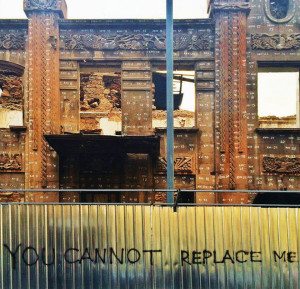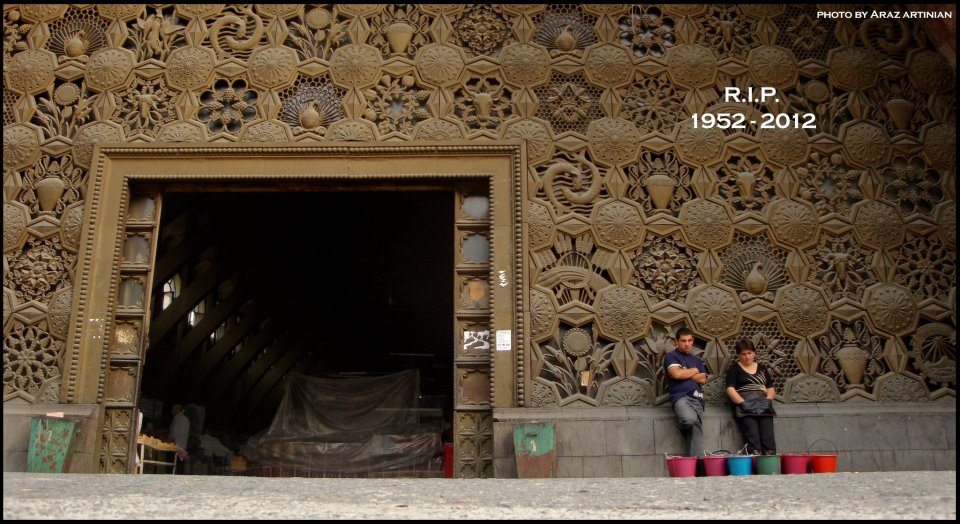




 |
 |
 |
 |
 |
VIP Forums Muzblog Chat Games Gallery. Ôîðóì, ìóçäíåâíèêè, ÷àò, èãðû, ãàëëåðåÿ. |
||||
|
||||||||
| Diaspora News and events in Armenian and other diasporas. |
 |
Reclaiming the Right to the City in ‘Elite’ Yerevan |
LinkBack | Thread Tools | Display Modes |
|
|
#1 (permalink) |
|
Top VIP VIP Ultra Club
Join Date: Jan 1970
Posts: 12,055
Rep Power: 67
 |
Special for the Armenian Weekly
‘The freedom to make and remake our cities and ourselves is, I want to argue, one of the most precious yet most neglected of our human rights.’  The 130-year-old Afrikian clubhouse, which once served as a milieu for cultural and political visionaries, recently fell victim to Millennium Construction’s bulldozers to make space for a new hotel project. (Photo: Arto Vaun) The 130-year-old Afrikian clubhouse, which once served as a milieu for cultural and political visionaries, recently fell victim to Millennium Construction’s bulldozers to make space for a new hotel project. (Photo: Arto Vaun)In reaction to this neo-liberal urbanism, the residents of Yerevan are struggling to reclaim their “Right to the City”2 and empower their existence as urban dwellers. This right not only encompasses citizens’ access to resources and public space, but also the right to contribute to the making of their urban space, the right to collectively shape their way of life, the right to preserve standards they value, and the right to be part of the discourse on urban matters. #ElectricYerevan is the most recent example, whereby thousands of citizens claimed their right to the street by spending their nights on Baghramyan Avenue, chanting and dancing as they protested against the electricity price hike. A Threatened Architectural Legacy and the Fight for Right to Heritage When the Armenian government in 1991 made certain changes to the List of Historical and Cultural Monuments of the City of Yerevan, several structures of historical and cultural value were left out. In 2010, controversy erupted over one such site, the Moscow Cinema Theater, which was set for demolition to make space for the construction of a church. An unprecedented activist movement emerged, with a Facebook group called “SAVE Cinema Moscow Open Air Hall” bringing 6,000 members together. After several public discussions and a campaign that garnered 26,000 signatures, the discourse took on broader socio-cultural and political dimensions. In an effort to contain the situation, the church and the government conceded, and the plan to demolish a bright example of 1960’s modernist architecture was shelved. The citizens had succeeded in asserting their right to the city. While Moscow Cinema Theater was saved, other structures continue to fall victim to destruction and avaricious development. Mashdots Street’s Historic Pak Shuka, built in 1952, was partially destroyed and converted into a supermarket. The building lost its architectural and spatial value, farmers lost their vending space, and consumers lost their access to affordable goods. The citizens’ right to the city was violated. Not too far from the Pak Shuka, some 32 monuments were destroyed for the Northern Avenue project. For many Yerevantsis, Northern Avenue was a failed project: its commercial and residential spaces are mostly empty, they do not cater to the ordinary residents, and its buildings overshadow the Opera House, a majestic landmark in Yerevan’s urban plan. Moreover, Northern Avenue is a concrete jungle in a city already suffocating from a lack of green spaces. The aforementioned examples, along with some 500 other structures of cultural and historical value that have been erased, illustrate the extent to which the government does not view heritage as an asset for the city’s development. These misguided policies that leave the Yerevantsis estranged in their own environment have prompted urban resistance: protests, graffiti, and online activism against violations of the city’s heritage.  Mashdots Street’s Historic Pak Shuka, built in 1952, was partially destroyed and converted into a supermarket (Photo: Araz Artinian) Mashdots Street’s Historic Pak Shuka, built in 1952, was partially destroyed and converted into a supermarket (Photo: Araz Artinian)Demographic Change and the Road to Emigration Under the pretext of “superior national interest,” the authorities have privatized several residential buildings, selling them to multinational real-estate companies. Residents have been forced out of their homes (sometimes illegally), and given inadequate compensation, leaving Yerevantsis with a chronic dwelling crisis. As a result, the city has witnessed a significant demographic change: Low- to middle-income residents have been pushed out, while a new “elite,” with ties to the ruling class, has moved in. Alienated, uprooted, and dispossessed, many are unable to afford a permanent solution to their housing problem. Their choice is to either seek temporary living arrangements or leave the country altogether. It is against this trend that movements such as the “Mer Kaghake” public-civil initiative strive to protect the rights of vulnerable residents, providing them with legal counsel, and empowering them to resist intimidation and eviction. From Activism to Policy-making Over the past half-decade, the broadening public debate on urban issues, coupled with activism, have gained wider support. Lectures, conferences, and exhibitions engaging different interested parties have become a mainstay of Yerevan’s intellectual life. Still, place-making decisions impacting the entire city are firmly controlled by the few—and there is no transparency, no effort to engage stakeholders in the decision-making process, and open competitions are almost unheard of. Under these circumstances, the grassroots struggle to reclaim the Right to the City remains key to challenging and shifting power relations and democratizing the process. What hangs in the balance is not only the preservation of our heritage, but the production of our cultural identity and our viability as a thriving society. Notes [1] Businessman and owner of 80 percent of shares in ArmSwissBank. 2 The»‘Right to the City’»is an idea and a slogan that was first proposed by»Henri Lefebvre»in his 1968 book»Le Droit ? la ville. Special for the Armenian Weekly ‘The freedom to make and remake our cities and ourselves is, I want to argue, one of the most precious yet most neglected of our human rights.’ –David Harvey The 130-year-old Afrikian clubhouse, which once served as a milieu for cultural and political visionaries, recently fell victim to Millennium Construction’s bulldozers to make space for a new hotel project. (Photo: Arto Vaun) The growth path of urbanization under capitalism is devouring the city of Yerevan. Luxurious high-rise hotels and residential towers, serving tourists and seasonal dwellers, are replacing Soviet social housing blocks that once lodged the ordinary Yerevantsis. The house where the president of the First Republic, Aram Manougian, lived and died—now at Vartan Sermakes’s1 disposal—is under serious threat. The 130-year-old Afrikian clubhouse, which once served as a milieu for cultural and political visionaries, recently fell victim to Millennium Construction’s bulldozers to make space for a new hotel project. Often, under the state’s nation building and modernity narratives (and to a certain extent the diaspora’s), Yerevan’s residents are witnessing destruction and dispossession on a daily basis. The shift in urban landscapes due to this construction doom is inevitably affecting the social, cultural, and economic life [...] Special for the Armenian Weekly ‘The freedom to make and remake our cities and ourselves is, I want to argue, one of the most precious yet most neglected of our human rights.’ –David Harvey The 130-year-old Afrikian clubhouse, which once served as a milieu for cultural and political visionaries, recently fell victim to Millennium Construction’s bulldozers to make space for a new hotel project. (Photo: Arto Vaun) The growth path of urbanization under capitalism is devouring the city of Yerevan. Luxurious high-rise hotels and residential towers, serving tourists and seasonal dwellers, are replacing Soviet social housing blocks that once lodged the ordinary Yerevantsis. The house where the president of the First Republic, Aram Manougian, lived and died—now at Vartan Sermakes’s1 disposal—is under serious threat. The 130-year-old Afrikian clubhouse, which once served as a milieu for cultural and political visionaries, recently fell victim to Millennium Construction’s bulldozers to make space for a new hotel project. Often, under the state’s nation building and modernity narratives (and to a certain extent the diaspora’s), Yerevan’s residents are witnessing destruction and dispossession on a daily basis. The shift in urban landscapes due to this construction doom is inevitably affecting the social, cultural, and economic life [...] [img][/img] More... |
|
|

|
|